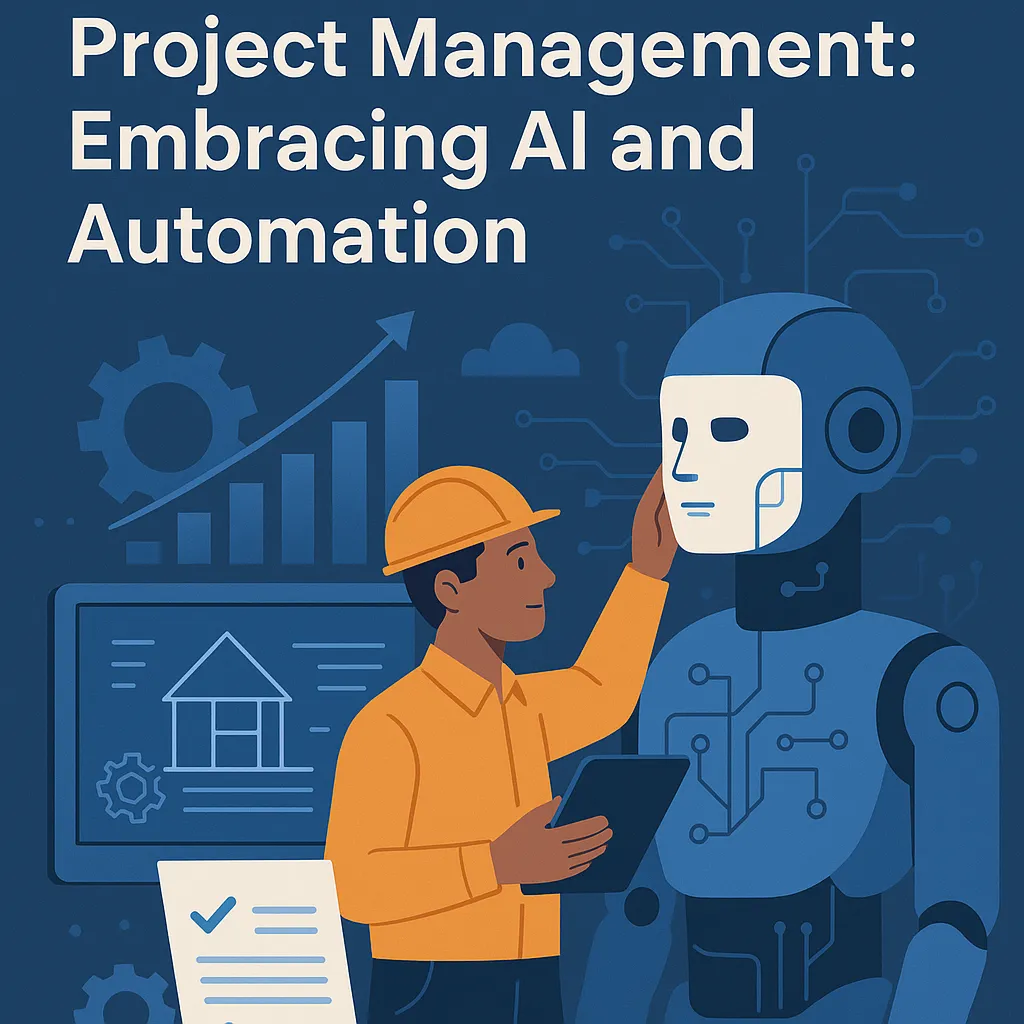Introduction
Effective project management is crucial for the successful execution of complex projects. Engineering project management serves as the bridge that connects innovative engineering concepts with practical applications, ensuring that projects are completed on time, within budget, and to the required quality standards. The role of an engineering project manager is pivotal, as they oversee the entire project lifecycle, from planning and execution to monitoring and controlling, while navigating the myriad challenges that arise in this intricate field, such as scope creep and resource allocation [11][12].
As industries evolve, the integration of technology has become increasingly significant. Among the most transformative forces reshaping project management across various sectors is artificial intelligence (AI) and automation. These technologies are not only streamlining processes but also enhancing decision-making capabilities, thereby boosting overall efficiency and productivity. AI can automate routine tasks, provide predictive insights, and optimize workflows, which is particularly beneficial in engineering project management where time and precision are paramount [3][8][9].
This blog post aims to delve into the profound impact of AI and automation on engineering project management. We will explore how these technologies are revolutionizing traditional practices, enabling project managers to focus on strategic decision-making rather than getting bogged down by repetitive tasks. By embracing AI, engineering project managers can enhance their ability to deliver successful projects, adapt to changes swiftly, and ultimately drive innovation in their field.
Understanding Engineering Project Management
Engineering project management is a specialized field that focuses on the planning, execution, and completion of engineering projects. It involves transforming ideas and designs into tangible results through a structured approach. Here are the key components and challenges associated with this discipline:
Definition and Key Components
At its core, engineering project management encompasses several critical elements:
- Project Objectives: Clearly defining what needs to be accomplished and the rationale behind it is essential. This sets the foundation for the entire project [12].
- Task Breakdown: Once objectives are established, they are divided into smaller, manageable tasks. This breakdown facilitates better resource allocation and timeline management [12].
- Resource Coordination: Effective project management requires the integration of various resources, including personnel, materials, and technologies, to achieve project goals [15].
- Timeline Management: Setting realistic timelines and milestones is crucial for tracking progress and ensuring timely completion of the project [12].
Common Challenges Faced by Engineering Project Managers
Engineering project managers encounter a variety of challenges that can significantly impact project success:
- Complexity of Projects: Engineering projects often involve numerous interdependent tasks, technical specifications, and regulatory requirements, making them inherently complex [13]. This complexity can lead to difficulties in planning and execution.
- Scope Creep: One of the most common challenges is scope creep, where project requirements expand beyond the original plan, leading to delays and budget overruns [11].
- Resource Management: Coordinating diverse resources effectively can be challenging, especially when dealing with unique technical requirements and constraints that engineering projects often present [15].
- Risk Assessment: Identifying and mitigating risks is crucial, as engineering projects can be susceptible to unforeseen challenges that may arise during the project lifecycle [4].
Significance of Effective Project Management
The importance of effective project management in engineering cannot be overstated. Successful project management ensures that:
- Projects are Completed on Time and Within Budget: By adhering to structured management practices, engineering projects can be delivered as planned, minimizing financial and time-related risks [9].
- Quality Outcomes: Effective management practices lead to higher quality results, as they facilitate better oversight and control over project processes [9].
- Stakeholder Satisfaction: Meeting project objectives and timelines enhances stakeholder confidence and satisfaction, which is vital for future project opportunities [9].
The Rise of AI and Automation in Project Management
The integration of artificial intelligence (AI) and automation technologies is revolutionizing the field of project management, particularly within the engineering sector. As engineering project managers navigate increasingly complex projects, these technologies are becoming essential tools for enhancing efficiency, decision-making, and overall project outcomes.
Overview of AI and Automation Technologies Relevant to Project Management
AI and automation technologies encompass a range of tools and systems designed to streamline project management processes. Key technologies include:
- Automated Scheduling Tools: These tools utilize algorithms to optimize project timelines, ensuring that resources are allocated efficiently and deadlines are met without manual intervention [3].
- Risk Assessment Software: AI-driven risk management tools analyze data to identify potential project risks, allowing managers to proactively address issues before they escalate [4].
- Resource Allocation Systems: These systems leverage AI to analyze project requirements and allocate resources effectively, minimizing waste and maximizing productivity [4].
- Generative AI: This emerging technology focuses on the machine-based production of high-quality content, which can assist in creating project documentation and reports, thereby reducing the administrative burden on project managers [1].
Trends and Statistics on AI Adoption in Engineering
The adoption of AI in engineering project management is on the rise, driven by the need for greater efficiency and accuracy. Recent statistics indicate that:
- A significant percentage of engineering firms are investing in AI technologies, with many reporting improved project outcomes and reduced operational costs [10].
- The trend towards automation is expected to continue, with projections indicating that AI will play a crucial role in the future of project management, particularly in enhancing decision-making processes and streamlining workflows [8].
- As AI technologies evolve, they are expected to reshape traditional project management methodologies, leading to more adaptive and hybrid approaches that combine agile and waterfall methods [14].
Major Drivers for Integrating AI in Project Management
Several factors are propelling the integration of AI and automation in engineering project management:
- Increased Complexity of Projects: As projects become more complex, the need for sophisticated tools to manage timelines, resources, and risks has grown. AI provides the analytical capabilities required to navigate these complexities effectively [6].
- Demand for Efficiency: Engineering firms are under constant pressure to deliver projects on time and within budget. AI-driven tools can automate repetitive tasks, allowing project managers to focus on strategic decision-making and innovation [3][7].
- Data-Driven Decision Making: The ability to analyze vast amounts of data quickly and accurately is a significant advantage of AI. This capability enables project managers to make informed decisions based on real-time insights, ultimately leading to better project outcomes [10].
- Workforce Autonomy: AI-driven project management tools are empowering engineers by providing them with more autonomy in their roles, allowing for a more dynamic and responsive project management environment [6].
How AI is Transforming Engineering Project Management
The integration of artificial intelligence (AI) into engineering project management is revolutionizing the way projects are planned, executed, and monitored. As the industry evolves, engineering project managers are increasingly leveraging AI technologies to enhance efficiency, improve outcomes, and foster innovation. Here are some specific ways AI is making a significant impact:
- Automated Scheduling and Resource Allocation: AI tools are streamlining the scheduling process by automating task assignments based on team members’ skills and availability. This not only saves time but also ensures that resources are allocated effectively, leading to improved project timelines and reduced bottlenecks. By 2030, it is predicted that AI could automate up to 80% of project management tasks, including data management and scheduling, allowing project managers to focus on more strategic aspects of their roles [3][10].
- Enhanced Risk Management through Predictive Analytics: AI empowers engineering project managers to proactively identify and mitigate risks. By utilizing predictive analytics, AI can analyze historical data and detect patterns that may indicate potential issues. This capability allows project managers to create contingency plans and address risks before they escalate into larger problems. Early warning systems powered by AI continuously monitor project data for signs of trouble, such as missed deadlines or resource shortages, enhancing overall project resilience [11][9].
- Improved Communication and Collaboration Tools Powered by AI: AI-driven communication tools facilitate better collaboration among project teams. These tools can automate updates, track project progress, and provide insights into team performance. By enhancing communication, AI helps ensure that all stakeholders are aligned and informed, which is crucial for the success of engineering projects. The use of AI in project management software, such as Asana and Trello, exemplifies how technology can enhance team collaboration and project tracking [12][14].
- Real-Time Data Analysis for Informed Decision-Making: The ability to analyze data in real-time is a game-changer for engineering project managers. AI systems can process vast amounts of data quickly, providing insights that inform decision-making. This capability allows project managers to make data-driven decisions, optimizing project performance and resource utilization. As AI continues to evolve, its role in strategic decision-making and stakeholder management will become increasingly vital, enabling project managers to forecast project outcomes with greater accuracy [15][9].
Case Studies: Successful Implementation of AI in Engineering Projects
The integration of artificial intelligence (AI) in engineering project management is not just a trend; it is reshaping the landscape of how projects are planned, executed, and monitored. Here, we explore notable case studies that illustrate the successful application of AI in engineering projects, highlighting the outcomes and benefits realized, as well as the lessons learned that can guide other engineering project managers.
1. AI-Driven Project Management Tools
One prominent example is a company that implemented an AI-based project management tool designed to analyze historical data. This tool predicts the optimal allocation of resources and adjusts project schedules in real-time. The outcome was a significant increase in project efficiency, as project managers could make informed decisions based on data-driven insights rather than intuition alone. This case underscores the importance of leveraging historical data to enhance project outcomes and streamline operations [1][10].
2. Predictive Analytics in Construction
Another case study involves the use of AI tools in large construction projects. These tools utilize predictive analytics to forecast project outcomes, enabling managers to anticipate potential delays and resource shortages. By implementing these AI solutions, the organization was able to reduce project overruns and improve overall project delivery times. The key takeaway here is that predictive analytics can serve as a powerful ally in risk management, allowing project managers to proactively address issues before they escalate [6][12].
3. Enhancing Operational Efficiency
A healthcare organization successfully integrated an electronic health record (EHR) system powered by AI, which significantly improved patient care and operational efficiency. The AI system facilitated better resource management and streamlined workflows, demonstrating how AI can enhance operational efficiency in complex engineering environments. This case illustrates that AI not only optimizes project management processes but also contributes to broader organizational goals, such as improving service delivery and patient outcomes [3][4].
4. Automating Repetitive Tasks
AI’s ability to automate low-value tasks has been a game changer for project managers. For instance, an AI assistant was deployed to handle routine tasks such as scheduling meetings and sending progress updates. This automation freed up project managers to focus on more strategic aspects of their projects, leading to improved productivity and job satisfaction. The lesson here is clear: by automating repetitive tasks, engineering project managers can allocate their time and resources more effectively, ultimately enhancing project performance [8][13].
5. AI-Generated Risk Management
One innovative approach involved the use of AI to generate risk logs automatically. This system identifies potential risks early in the project cycle, allowing teams to address them proactively. The implementation of AI-generated risk management tools led to a more robust risk assessment process, reducing the likelihood of project failures. This case highlights the critical role of AI in enhancing risk management practices, which is essential for the success of engineering projects [14][12].
Challenges and Considerations in Adopting AI
As engineering project managers look to embrace the transformative potential of artificial intelligence (AI) and automation, several challenges and considerations must be addressed to ensure successful integration. Here are the key hurdles that project managers may encounter:
- Data Security and Privacy Concerns: One of the foremost challenges in adopting AI is ensuring data security and privacy. Engineering projects often involve sensitive information, and the use of AI tools raises concerns about how this data is stored, processed, and shared. Project managers must navigate compliance with data protection regulations and establish robust security protocols to safeguard project data from breaches and unauthorized access [2][4].
- Need for Training and Upskilling: The integration of AI into project management processes necessitates a shift in skill sets among project management teams. Engineering project managers must invest in training and upskilling their teams to effectively utilize AI tools. This includes developing data literacy, technical proficiency with AI applications, and critical thinking skills to interpret AI-generated insights. Continuous learning will be essential to keep pace with evolving technologies and methodologies [5][10].
- Integration with Existing Tools and Processes: Another significant challenge is the integration of AI with current project management tools and workflows. Many engineering firms rely on established systems and processes, and introducing AI can disrupt these frameworks. Project managers need to carefully assess how AI solutions can complement existing tools, ensuring a seamless transition that enhances productivity without causing operational disruptions. This may involve customizing AI applications to fit specific project needs and ensuring compatibility with legacy systems [6][9].
The Future Landscape: What to Expect
As we look towards the future of engineering project management, the integration of artificial intelligence (AI) and automation is set to redefine the landscape significantly. Here are some key points to consider regarding the advancements in AI technology and their implications for project management:
Potential Advancements in AI Technology
- Increased Automation of Tasks: AI is expected to automate a wide range of administrative tasks, such as scheduling meetings, generating reports, and managing documentation. This will allow engineering project managers to focus more on strategic decision-making rather than routine tasks, enhancing overall productivity and efficiency [9][15].
- Enhanced Predictive Analytics: With the ability to analyze vast amounts of historical project data, AI can provide predictive insights into project timelines, resource allocation, and potential risks. This capability will enable project managers to make informed decisions and proactively address challenges before they escalate [5][9].
- Real-time Monitoring and Optimization: AI-driven tools will facilitate real-time monitoring of project progress, allowing for immediate adjustments to plans and resources. This dynamic approach will lead to more agile project management, where changes can be implemented swiftly in response to evolving project conditions [7][10].
Evolving Role of the Engineering Project Manager
- From Task Manager to Strategic Leader: As AI takes over routine tasks, the role of the engineering project manager will evolve from a focus on day-to-day management to a more strategic leadership position. Project managers will need to leverage AI insights to guide their teams and make high-level decisions that align with organizational goals [12][14].
- Collaboration with AI Systems: Engineering project managers will increasingly collaborate with AI systems, utilizing their capabilities to enhance project outcomes. This partnership will require project managers to develop a strong understanding of AI tools and their functionalities, ensuring they can effectively integrate these technologies into their workflows [6][11].
Importance of Continuous Learning and Adaptation
- Staying Ahead of Technological Change: The rapid pace of technological advancement necessitates that engineering project managers engage in continuous learning. This includes staying updated on the latest AI developments and understanding how these innovations can be applied to improve project management practices [3][12].
- Cultivating a Growth Mindset: Embracing a growth mindset will be crucial for project managers as they navigate the complexities of an AI-driven environment. This mindset encourages adaptability and resilience, enabling managers to thrive amidst change and leverage new technologies to their advantage [14][15].
Conclusion
As we look towards the future of engineering project management, it is clear that artificial intelligence (AI) is playing a transformative role in reshaping the landscape of the industry. The integration of AI technologies is not merely a trend; it is a fundamental shift that enhances efficiency, optimizes workflows, and automates routine tasks. By automating repetitive processes such as scheduling, budgeting, and risk assessment, AI allows project managers to focus on more strategic aspects of their projects, ultimately leading to improved outcomes and reduced errors [3][9].
Engineering project managers are encouraged to actively explore the myriad of AI tools and strategies available. These advanced project management solutions are designed to streamline processes and provide predictive insights that can significantly enhance decision-making capabilities [4][9]. Embracing these technologies not only positions project managers at the forefront of innovation but also empowers them to lead their teams more effectively in an increasingly complex environment.
In conclusion, staying informed about the latest developments in AI and automation is crucial for engineering project managers. As the industry continues to evolve, those who adapt and leverage these advancements will be better equipped to tackle the challenges of tomorrow. We invite you to engage with the ongoing discourse surrounding AI in project management, participate in relevant training, and share insights with your peers. By doing so, you will not only enhance your own practices but also contribute to the collective growth of the engineering project management community. Embrace the future—let AI be a catalyst for your success.
Find out more about Shaun Stoltz https://www.shaunstoltz.com/about/.
This post was written by an AI and reviewed/edited by a human.



